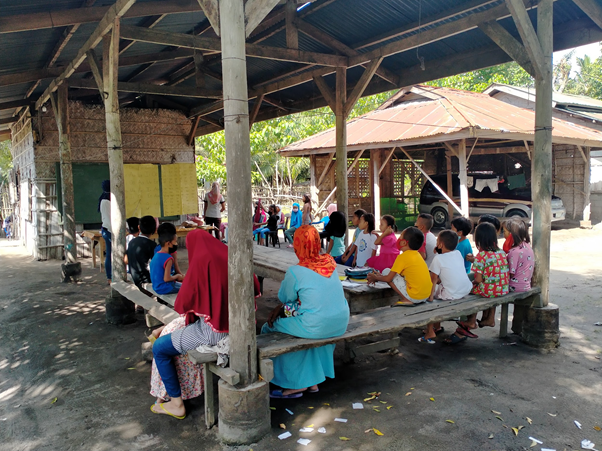
By Manolo Serapio Jr.
A COVID-free town in Maguindanao province has launched a reading program outdoors, hoping to boost the competency of children even as the coronavirus pandemic kept schools across the Philippines closed for more than a year.
Zaddam Alim, head of the Tumbao Central Elementary School in Mangudadatu, came up with the idea after seeing the number of parents picking up learning modules for their children dwindle in January.
“The parents were complaining that their children were not learning anything from the modules,” says Alim’s sister Zarina Mae Alim, a kindergarten teacher. Many parents are unable to take on the teachers’ role at home since they themselves cannot read and write, says Zarina.
That gave birth to the Adopt-A-Purok reading program in the municipality where teachers tutor students from kindergarten to Grade 6 on how to read properly at least twice a week within their purok, or small community area.
The program started in Tumbao Central Elementary School in February and has now expanded to six schools, says Zarina. Up to 100 children from each purok, divided into smaller groups and complying with health protocols, participate in learning words, rhymes, tongue twisters and reading short stories in both English and Filipino, she says.
“This program is meant to motivate the children to learn in the midst of a pandemic,” said Zarina. The 26-year-old teaches phonetics and drawing to the kindergarten children.
Zaddam, the school principal, has challenged all 14 teachers who are part of the program to help increase the number of readers among the children.
Unlike the rest of the country where COVID-19 cases spiked again this month, Mangudadatu has been largely spared from the outbreak, with municipal officials recording only one confirmed case last year, said Zarina.

It takes a village
Since it takes a village to teach a child, barangay officials also help out by providing the learning space and chairs for the children. Barangay councilor Teng Tumindeg built a makeshift stand for the reading materials and some parents also provided some needed materials, said Zarina.
The reading materials are printed using photocopiers provided by the United Nations Children’s Fund, she says.
UNICEF, supported by the Government of Japan, works with Synergeia Foundation in improving the quality of basic education in Mangudadatu and other municipalities in the Bangsamoro Autonomous Region in Muslim Mindanao.
Synergeia has been pushing its local government partners to hold limited in-person tutorials safely in their purok and other open areas to help students cope with remote learning. They are being implemented in other parts of Maguindanao as well as in Iloilo, Lanao del Sur and La Union provinces.
The tutorial sessions focused on reading because it’s a weak area for most grade school students in the municipality, says Zarina. But she said the teachers would soon mentor the students on other subject areas.
Through the reading program, the teachers in Mangudadatu are hoping to fill some of the learning gaps that the pandemic may have exacerbated.
Only 10% of Filipino Grade 5 pupils had achieved the reading literacy skills expected at the end of primary school, versus 82% in Vietnam and 58% in Malaysia, according to the 2019 Southeast Asia Primary Learning Metrics done by UNICEF and the Southeast Asian Ministers of Education Organization.
“During this pandemic, the children are lucky if they have parents or an older sibling who can help them. Otherwise, they’d be left out,” says Zarina. “For a child to learn at this time, a teacher has to be innovative.”




